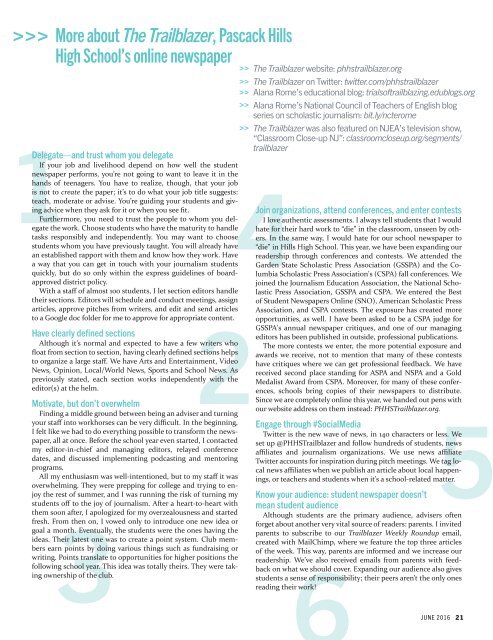HIP-HOP
Review_June2016
Review_June2016
You also want an ePaper? Increase the reach of your titles
YUMPU automatically turns print PDFs into web optimized ePapers that Google loves.
More about The Trailblazer, Pascack Hills<br />
High School’s online newspaper<br />
1Delegate—and trust whom you delegate<br />
If your job and livelihood depend on how well the student<br />
newspaper performs, you’re not going to want to leave it in the<br />
hands of teenagers. You have to realize, though, that your job<br />
is not to create the paper; it’s to do what your job title suggests:<br />
4<br />
teach, moderate or advise. You’re guiding your students and giving<br />
advice when they ask for it or when you see fit.<br />
Furthermore, you need to trust the people to whom you delegate<br />
the work. Choose students who have the maturity to handle<br />
tasks responsibly and independently. You may want to choose<br />
students whom you have previously taught. You will already have<br />
an established rapport with them and know how they work. Have<br />
a way that you can get in touch with your journalism students<br />
quickly, but do so only within the express guidelines of boardapproved<br />
district policy.<br />
With a staff of almost 100 students, I let section editors handle<br />
their sections. Editors will schedule and conduct meetings, assign<br />
articles, approve pitches from writers, and edit and send articles<br />
to a Google doc folder for me to approve for appropriate content.<br />
2<br />
Have clearly defined sections<br />
Although it’s normal and expected to have a few writers who<br />
float from section to section, having clearly defined sections helps<br />
to organize a large staff. We have Arts and Entertainment, Video<br />
News, Opinion, Local/World News, Sports and School News. As<br />
previously stated, each section works independently with the<br />
editor(s) at the helm.<br />
Motivate, but don’t overwhelm<br />
Finding a middle ground between being an adviser and turning<br />
your staff into workhorses can be very difficult. In the beginning,<br />
I felt like we had to do everything possible to transform the newspaper,<br />
all at once. Before the school year even started, I contacted<br />
my editor-in-chief and managing editors, relayed conference<br />
dates, and discussed implementing podcasting and mentoring<br />
programs.<br />
All my enthusiasm was well-intentioned, but to my staff it was<br />
overwhelming. They were prepping for college and trying to enjoy<br />
the rest of summer, and I was running the risk of turning my<br />
students off to the joy of journalism. After a heart-to-heart with<br />
them soon after, I apologized for my overzealousness and started<br />
fresh. From then on, I vowed only to introduce one new idea or<br />
goal a month. 3Eventually, the students were the ones having the<br />
ideas. Their latest one was to create a point system. Club members<br />
earn points by doing various things such as fundraising or<br />
writing. Points translate to opportunities for higher positions the<br />
following school year. This idea was totally theirs. They were taking<br />
ownership of the club.<br />
The Trailblazer website: phhstrailblazer.org<br />
The Trailblazer on Twitter: twitter.com/phhstrailblazer<br />
Alana Rome’s educational blog: trialsoftrailblazing.edublogs.org<br />
Alana Rome’s National Council of Teachers of English blog<br />
series on scholastic journalism: bit.ly/ncterome<br />
The Trailblazer was also featured on NJEA’s television show,<br />
“Classroom Close-up NJ”: classroomcloseup.org/segments/<br />
trailblazer<br />
Join organizations, attend conferences, and enter contests<br />
I love authentic assessments. I always tell students that I would<br />
hate for their hard work to “die” in the classroom, unseen by others.<br />
In the same way, I would hate for our school newspaper to<br />
“die” in Hills High School. This year, we have been expanding our<br />
readership through conferences and contests. We attended the<br />
Garden State Scholastic Press Association (GSSPA) and the Columbia<br />
Scholastic Press Association's (CSPA) fall conferences. We<br />
joined the Journalism Education Association, the National Scholastic<br />
Press Association, GSSPA and CSPA. We entered the Best<br />
of Student Newspapers Online (SNO), American Scholastic Press<br />
Association, and CSPA contests. The exposure has created more<br />
opportunities, as well. I have been asked to be a CSPA judge for<br />
GSSPA's annual newspaper critiques, and one of our managing<br />
editors has been published in outside, professional publications.<br />
The more contests we enter, the more potential exposure and<br />
awards we receive, not to mention that many of these contests<br />
have critiques where we can get professional feedback. We have<br />
received second place standing for ASPA and NSPA and a Gold<br />
Medalist Award from CSPA. Moreover, for many of these conferences,<br />
schools bring copies of their newspapers to distribute.<br />
Since we are completely online this year, we handed out pens with<br />
our website address on them instead: PHHSTrailblazer.org.<br />
Engage through #SocialMedia<br />
Twitter is the new wave of news, in 140 characters or less. We<br />
set up @PHHSTrailblazer and follow hundreds of students, news<br />
affiliates and journalism organizations. We use news affiliate<br />
Twitter accounts for inspiration during pitch meetings. We tag local<br />
news affiliates when we publish an article about local happenings,<br />
or teachers and students when it’s a school-related matter.<br />
Know your audience: student newspaper doesn’t<br />
mean student audience<br />
Although students are the primary audience, advisers often<br />
forget about another very vital source of readers: parents. I invited<br />
parents to subscribe to our Trailblazer Weekly Roundup email,<br />
created with MailChimp, where we feature the top three articles<br />
of the week. This way, parents are informed and we increase our<br />
readership. We’ve also received emails from parents with feedback<br />
on what we should cover. Expanding our audience also gives<br />
students a sense of responsibility; their peers aren’t the only ones<br />
reading their work!<br />
5<br />
JUNE 2016 21


